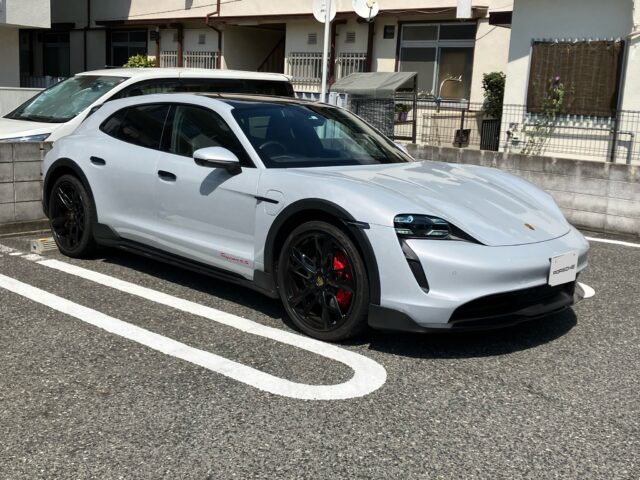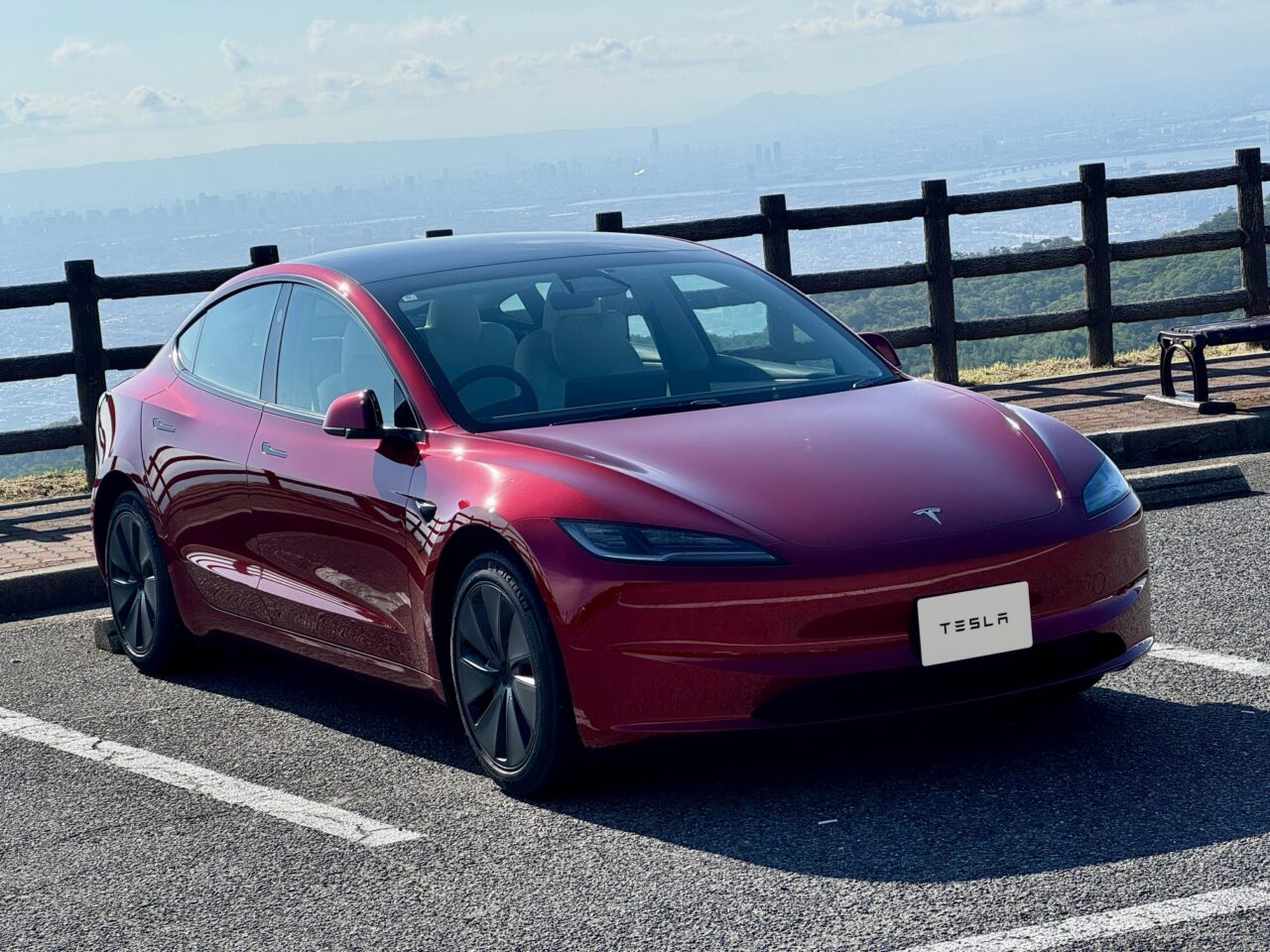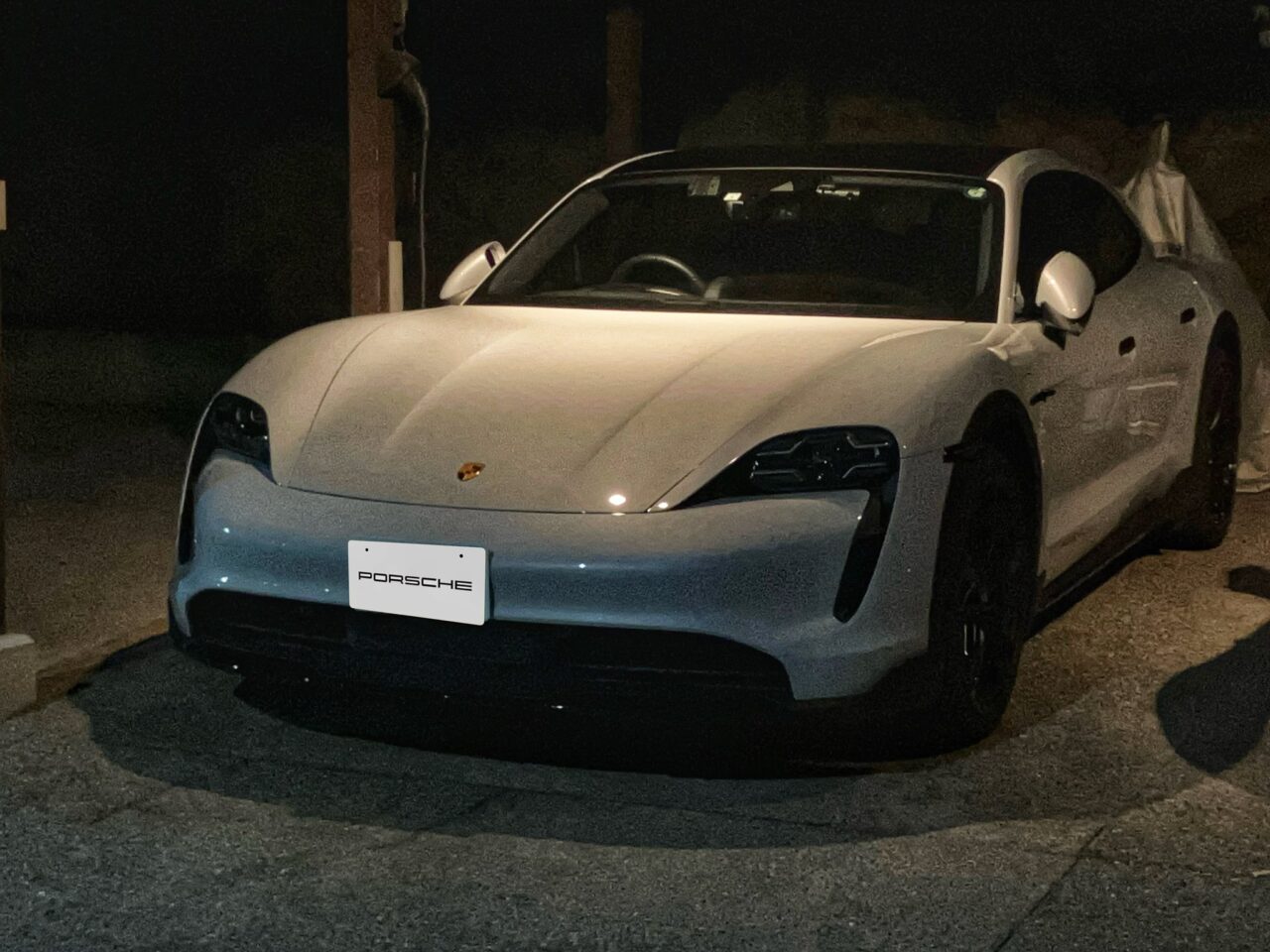Driving long distances in an electric car is impossible, right? We tried to explain common misconceptions from the owner's point of view.
Release Date

Usually when we talk about Taikan or Model 3, we say, "But electric cars can't run long distances, can they?It is often referred to as "the
I'm afraid that if I drive, I'll gradually run out of charge and have to stop in the middle of the road (laughs)... With gas stations, there are gas stations everywhere, so I'll be fine, but not with electricity, so I'm afraid of driving long distances."
."No, no, no, no, you wouldn't do that kind of unplanned running.I was thinking, "I'm not sure what I'm supposed to do.
It can run quite well. Both Tesla's Model 3 and Porsche's Taikan can run long distances. Our Taikan can run 370 km on a full charge, and even when driving normally from home to Fuji Speedway without thinking about the cost of electricity, we only had to charge the battery once during the 450 km one-way trip. It was a 90kW quick charge, and it took only 30 to 60 minutes. The charge is completed while I'm having lunch, and that's not a problem at all."
Although the "No, but I'm afraid of getting stuck in traffic, and I'm afraid I'll lose more and more charge. I'd feel safer on gasoline.This makes us realize that the image of electric vehicles is quite deep-rooted.
So in this article, I hope to dispel some of those misconceptions in the world (laughs).
contents
Explanations for misconceptions about electric vehicles
Below, we would like to proceed by explaining one by one the misconceptions about electric vehicles.
(1) Short cruising range
I hear this kind of argument all the time. There are many fuel-efficient gasoline-powered cars available today, and I used to have one in my home,Mercedes-Benz GLB200dwas able to run about 700 km on a full tank, so the cruising range is indeed short by comparison.
But.As for the Taikan, it can run about 370 km on a full charge, and the Model 3 can run about 550 km.

Previously Model 3 from Hyogo Prefecture to Toba, Mie Prefecture,We drove about 670 km round trip in the Tesla, and upon arrival at the hotel, the battery had about 501 TP3T remaining.We had confirmed in advance that the hotel where we were staying had regular charging facilities, so we charged the battery there, and by the next morning it was charged to 100%.
And on the way home, I drove without recharging the battery once and arrived home with about 20% left.
Certainly there is no substitute for a longer cruising range, but "theEven if you can run this much on a full charge, it's still not enough.I wonder if there are not many situations in which the "I'm not so sure.
In addition, electric vehicles do not lose charge in traffic jams (gasoline-powered vehicles obviously lose charge). I have heard rumors that if you are stuck in traffic in the middle of winter, the charge will decrease rapidly, but in fact, the Taikan was delivered in January of this year, and although I have experienced a fair amount of traffic jams, I have no such sensation.
In addition, electric vehicles use a regenerative energy system, which reduces the charge when going uphill, such as on mountain roads,The charge is restored on the descent.This is a mechanism not found in gasoline-powered vehicles, and even when driving over mountains, it is often the case that the battery charge is surprisingly low when the lid is opened.
(2) Lack of charging infrastructure
Comparing gas stations to charging spots, gas stations are everywhere, and the infrastructure is not adequate. However, there are currently over 21,000 electric charging spots (as of the end of August at GoGoEV), and of course, not all of them can take advantage of the various types of fast charging, regular charging, and Tesla's Supercharger, although there are regional differences,It is a feeling that is increasing quite a bit.

Image source: https://ev.gogo.gs/news/detail/1725239618/
Also on the GoGoEV website,
The month of August, which saw many natural disasters, also provided an opportunity for local governments to review their disaster preparedness. Since EVs, which can be used as storage batteries, can play an important role in disaster prevention, it is expected that local governments will promote the spread of EVs and develop recharging infrastructure as part of their disaster prevention measures.
It was written. With the government's policy of making all new cars sold by 2035 electric vehicles, I wonder if infrastructure development in this area will make progress.
In addition, the penetration rate of electric vehicles is not yet high in Japan at this time,Charging spots are often relatively empty.In my experience, I never had to wait for a recharge, especially since there are sometimes multiple recharging spots on the highway.
(iii) Inconvenient due to long charging time
Charging does not take 3 to 5 minutes, as it does at a gas station. Since Taikan's charging capacity is 90 kWh, it would take one hour to go from 0 to full with a 90 kW quick charge (although it is almost never actually at 0).
This is the only thing I see that takes time,If you charge the battery while eating lunch at a highway service area, you can finish charging the battery during that time.In addition, some parking lots in Osaka have free 200 V regular charging stations, which are almost always open, so if you charge while parked, by the time you return, you will often have recovered enough for the trip to get you there.
The gas station isI go out of my way to refuel."sense, but because we think of electric vehicles in that sense, we feel that it is a hassle. In the case of electric vehicles,Instead of going all the way, "I'll just charge it while I'm parked."That's the feeling. Just like charging your phone when you are not looking at it.
If you change your mindset, there is no inconvenience.

In that sense.It would be quite convenient to have a regular charging facility at home, and that is exactly what we can use on a daily basis, just like charging a smartphone.If you do not have charging facilities at home, it may be a little inconvenient, but if you use a parking lot with charging facilities where you usually park when you go out, there should not be a big problem.
(4) Driving performance is inferior to gasoline-powered vehicles
Especially when I mention that I drive a Tesla.Electric cars don't drive that well, do they? They are eco-friendly, but they still run on gasoline.Many people often speak of their impression that
In such a case, "No, no, no...please tell me after you drive one. The driving experience of an electric car is really amazing. You'll be surprised.I sometimes answer with a lot of pressure (laughs).
I do not have experience with electric cars from all manufacturers,The only two vehicles that I would like to mention are the Taikan and the Model 3, and the first thing I would like to mention about these two vehicles is that they are very comfortable.
It is smooth, has no rattles (although the legs of the Taikan are stiff and may rattle depending on the road surface), and is truly luxurious and comfortable.
Stability and acceleration performance are also excellent.The instantaneous torque, unique to electric vehicles, makes the car suddenly very fast, even when merging on the highway or when overtaking a car.
In terms of the acceleration feeling of being pressed against the seat, the Model 3 is faster than the Taikan.
That feeling can never be experienced in a gasoline-powered car, and once you have it, it is addictive.As for the Taikan, it is said to have been developed with the aim of becoming a 911, and it has both the handling qualities of a sports car and the ride quality of a Porsche itself.
I prefer to drive an electric car for long distances on the highway because it rides and drives better, and it is stress-free. (Of course, it is a matter of preference.)
I just can't get this feeling from just reading the text or watching test drive videos on youtube.
You can't know unless you ride and experience it, so I hope you will give it a test drive (I am not a salesman, W).
I should have owned it sooner...!
Public misconceptions about electric vehicles still persist.
But in fact, in the last few years,Cruising range, charging infrastructure, charging time, driving performance...all of these are more advanced than we could have imagined.It always takes time for new things to be accepted by the world, but I am sure that when you own one, you will find that you will be able to enjoy it.Wish I had owned it sooner...You may often think, "I'm not sure what I'm supposed to do.
In fact, one of my acquaintances wants to drive an electric car in the near future, and I plan to give him a ride. I hope that I can convey the beauty of electric cars at the grassroots movement level.
Follow me if you like this blog!


Comment ( 5 )
Trackbacks are closed.
Hi @@@@.
I enjoyed reading this very interesting compilation.
I like gasoline cars so much that my blood is made of high octane (self-proclaimed), but reading your blogs, I have recently become interested in EVs as well.
One thing I am wondering is how long the battery life will be. This is something that will only be known after many years of use, but I am sure that as technology evolves, the lifespan will also increase.
Although there is no doubt that the car is excellent as a vehicle, I am concerned that the life cycle of the battery may make the car disposable. It is not proper for a person who burns a lot of gasoline to talk about the environment, but I would like to think about the question of how much the environmental performance of a car will be recognized when the life cycle of each car is shortened.
Hello, HAMABOKU.
As for battery life, for example, according to Tesla's official data, the Model 3 and Model Y batteries maintain 851 TP3T of capacity even after about 320,000 km, while the Model S and Model X batteries are reported to maintain about 881 TP3T of capacity.
Many Japanese people think that batteries degrade like smartphones because of the experience and rumors of the first generation Nissan LEAF, which quickly degraded its battery, but this is not the reality.
My Model 3 has already run more than 7000 km since I bought it, and at this point it is maintaining more than 99.91 TP3T.
https://www.tesla.com/ns_videos/2023-tesla-impact-report-highlights.pdf
Given these data, my personal view is that EVs have fewer moving and worn parts than engines, do not require oil, and have less load since the brakes are mainly regenerative,
Besides, given that the battery lasts this long, will there be a future in which it turns out to have a surprisingly longer life than an engine-powered car? I expect this to be the case.
However, in terms of environmental impact, I do not believe that EVs have less of an environmental impact just because they are EVs, and when you consider manufacturing and disposal, they are not much different, are they? I think it is a good idea.
So, although I drive an EV, I do not intend to do so out of any particular environmental consciousness, but simply because I enjoy driving an electric motor.
As for the range and power performance, I think the former car has a strong image of the original Leaf, and the latter has a strong image of the panda ride on top of the department store. lol
As for the cruising range, I don't think you'll get the sense that "it's not as bad as I thought it would be" until you own one, but as for the latter dynamic performance, especially for those who have driven sports cars and sports sedans, I guess "a picture is worth a thousand words.
Back in 2019 when I switched to the Model 3 Performance, I remember having car enthusiast friends (BMW M3/M4/M5 drivers, etc.) drive it and they all reacted as expected and enjoyed it.
Hello, Model3 Life!
The panda ride on top of the department store." LOL!
Really, the image may be like that.
The advent of EVs is simply another new form of vehicle, which is essentially a welcome expansion of choice,
For some reason, many people stubbornly insist that the car must have an engine. I am puzzled.
It's those people who, when they get on board, change their minds. Like me (laughs).
Hiro
Thank you for your prompt response.
Well, I had no idea that such data had been published. I realized the danger of speaking only with images without doing my own research...
I also had a negative image of battery life because of the image of the first-generation LEAF. However, if the performance of the battery alone is maintained that well, it is likely that the life of the car is much longer than people's (including myself) image of it, taking other consumable parts into consideration. I learned a lot.
I myself have a w204 c200 (AMG Sport Package Plus, which is just an AMG spec) as a getaway car. It has hard legs that are not like a Mercedes...but when I take it to the mountains, it runs surprisingly well. I like NA engines, but I sometimes feel turbo lag and lack of linearity since it is an early downsizing turbo car. I also feel that the fuel economy is not as good as I thought. Also, the fuel economy is not as good as I expected. I like the packaging of the car, though.
In that sense, I think BEV might be fun, as Hiro said.
I have digressed for a long time. Once again, thank you very much for your guidance!